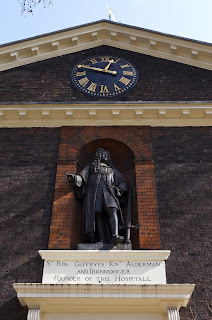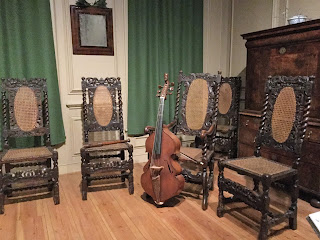On 6th January I went along the Geffrye Museum's Farewell to Christmas. I discovered a very long queue for the Twelfth Night cake and warm mulled wine on my arrival. The evening also involved carol singing with the traditional burning of the holly decorations at the end (as above).
The Geffrye is London's Museum of the Home in Hoxton, East London. The buildings were originally almhouses (houses for the poor) built by the Company of Ironmongers in 1714 following a bequest by Sir Robert Geffrye, their former Master. Robert Geffrye was a Cornish merchant who moved to London. During his illustrious career, he became Sheriff of London, Lord Mayor of London and was knighted.
Sir Geffrye's statue looked down on us as we sang carols. In fact his costumed 'stand-in' complete with wig lead the evening's proceedings with good humour in the rainy conditions. The Twelfth Night revellers' carol sheets got a little soggy as they sang. All were still of good cheer singing out the last night of the Christmas period.
You can see my brief record of the night including the holly burning on the YouTube video below.
Geffrye's Christmas Past Exhibition
During my visit, I also took an opportunity to see the period rooms inside the museum. The Christmas Past Exhibition showed the rooms decorated according 400 years of seasonal English traditions.
Christmas has always been a time to gather with friends and family, eat and be merry.
Music played an important role in the home as well as in church.
Sparse Decorations
It was noticeable that decorations gradually became more lavish over the centuries. One notable exception was during time of the Puritans. They barely had any decorations at all.
Back to the Future?
One room particularly hit me as it looked like a combination of my grandparents' homes. It was like stepping back in time. The positioning of the Christmas tree in the window and the doll in the chair felt uncanny. I recognised the decorations as sandcastle flags.
The era didn't quite fit with the Geffrye's blurb. However, I suppose that people did not change their furnishings and furniture as often as we do today. It was very much a matter of 'make do and mend' for my grandmothers' generation.
I got further shocks as I walked on. I felt that I had stepped into my own childhood Christmases. I was not the only one, as I overheard others reminiscing about their past Christmases. One room looked like that of a friend's house whose parents were older than mine.
My parents had more a more modern style of furniture, if not quite as below.
I was stunned to recognise the style of paper decorations on the ceiling.
Even the wrapping paper all over the floor looked familiar, although the presents were from an earlier time.
Teenage Bedrooms Exhibition
Still reeling from my 'Back to the Future' experience, I moved on to the Geffrye's Teenage Bedrooms exhibition. It came as even more of a shock to find that my own children's experiences (who are still teenagers) are already history. The past medals and keepsakes... the line of Harry Potter books... those irritating cards and plastic figures they used to collect because their friends did ... They're history!
There was only one actual teenage bedroom set up. The others were formed from photographs of actual teenager's rooms, along with various comments. I loved the noticeboard with visitor comments about their own rooms or those of sons, and daughters'. Many comments struck a chord with me.
The Geffyre museum demonstrates the gradual increase in wealth across class boundaries that my generation and my parents' generation saw in our lifetimes. Today's teenagers are expected to struggle more financially especially after Brexit. They are already running up student debts and may never own their own homes. They are unlikely to inherit much either, as their parents may be forced to sell their homes to finance care in old age.
Debt-laden from student days, homes ever dependent on landlords, responsible for both children and ageing parents, precarious employment with limited chances to save for their own future and pensions... it's a gloomy prospect for today's teenagers post-Brexit. I studied and worked hard for a better future for my children than I, my parents or my grandparents knew.
Nobody seems to have the answer on how the Economy will work if technology takes away jobs. Punitive measures won't work if there aren't jobs for all sections of the community. How will pensions work?
Debt-laden from student days, homes ever dependent on landlords, responsible for both children and ageing parents, precarious employment with limited chances to save for their own future and pensions... it's a gloomy prospect for today's teenagers post-Brexit. I studied and worked hard for a better future for my children than I, my parents or my grandparents knew.
Nobody seems to have the answer on how the Economy will work if technology takes away jobs. Punitive measures won't work if there aren't jobs for all sections of the community. How will pensions work?
We already have foodbanks, a shortage of affordable homes and the homeless sleeping rough in the streets in mid-winter. Standing in a former almshouse, I wondered if the haves will help the have-nots again?
I thought of my maternal grandmother. Her only hope of becoming wealthy was to win the pools or the lottery. She dreamed of owning a cottage with roses growing over the door. She won the pools once. The family story goes that she was incredibly excited. Only everyone in the country seemed to win too that weekend. All she could afford was a new rug to go in front of the fire.
My visit to the Geffrye felt like a farewell to more than Christmas 2016/17.
Definitions and further information
almshouse in British History
British history a privately supported house offering accommodation to the aged or needy
mainly British another name for poorhouse
haves and have-nots
Collins dictionary: the people who are very wealthy and the people who are very poor
The stark contrast between the haves and have-nots has always existed but in a recession the injustices become more painful.
Company of Ironmongers
Sir Robert Geffrye
The Geffyre, Museum of the Home














No comments:
Post a Comment